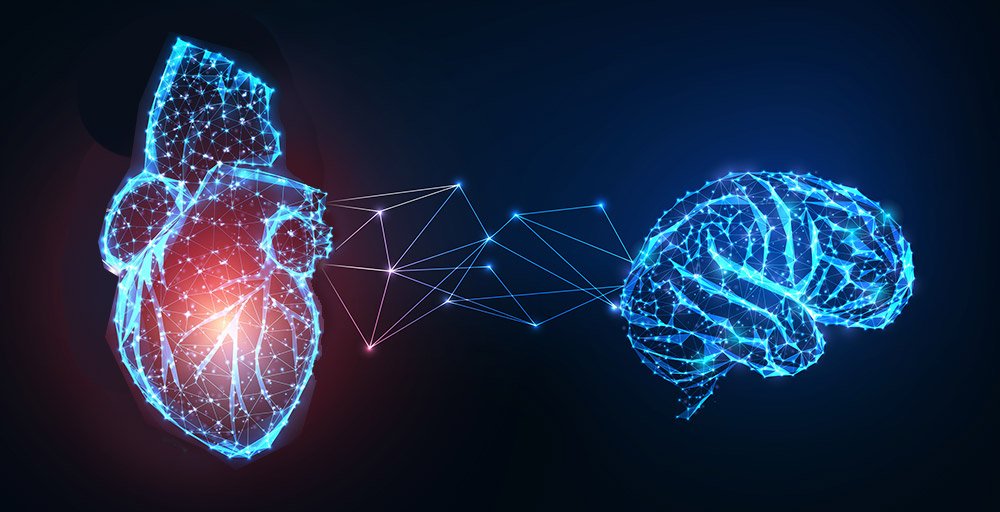
How a weak heart damages the brain – heart disease alters gene activity in the hippocampus, and can thus lead to dementia
The connection between the heart and the brain: Researchers may have discovered why people with heart failure are more likely to develop Alzheimer’s disease and other cognitive deficits. Accordingly, heart disease alters the DNA wrapping in the hippocampus, the brain’s memory center. This epigenetic change impairs gene activity and thus brain cell function. But there could be a cure against it.
About four million people in Germany suffer from heart failure – the heart muscle weakens due to a heart attack or other illness and less blood is pumped through the body. As a result, not only physical performance is limited, but often mental:
“People with heart problems, especially heart failure, can experience significant cognitive deficits and an increased risk of developing Alzheimer’s disease,” explains André Fischer of the German Center for Neurodegenerative Diseases (DZNE) in Göttingen. Also Gray matter in the brain It often goes down if the heart is weak. But the reason is not clear yet.
Heart failure alters the activity of genes in the hippocampus
Now Fisher and his team have new leadership. For their study, they scanned the brains of mice that had suffered from heart failure. “On memory tests, the heart failure mice performed significantly worse than their healthy counterparts,” Fisher explains. Then we examined neurons in the hippocampus. The hippocampus is the memory center in the brain, and it is also the area that has been particularly hard hit by Alzheimer’s and other dementias.
Tests showed: if the heart weakens, this also affects the neurons in the hippocampus. Scientists have found that they show increased stress signals and alter their genetic activity. Among other things, more than 4,600 genes are read with less power, many of which are important for mental performance and memory. A possible reason for this may be the insufficient supply of oxygen to the brain cells.
“These changes in the gene expression of the hippocampus in cardiac impaired mice are similar to the changes that occur in neurodegenerative disease models,” Fisher and his team explain.
The DNA of the nerve cells remains wrapped very tightly
But how do these changes happen? Careful analyzes revealed that the genetic material in the cells of the hippocampus in cardiac impaired mice had a different three-dimensional structure – it was literally twisted in a twisted form. “Genes can only be active if they are within the reach of the cell mechanism. To do this, the DNA must be loosely wound into the appropriate points. Similar to a ball of strings from which loops protrude,” Fisher says.
However, in mice with heart problems, the DNA in neurons was encapsulated more tightly than their healthy counterparts. Scientists have identified chemical changes as the reason for this tight twisting Histone. These are special proteins that make up the supporting structure of DNA: they function, so to speak, as rollers of strings around which strands of DNA are wrapped.
“Our study thus provides the first insight into how heart failure can lead to nerve cell deficiencies,” the researchers say.
Cancer medication helps combat cognitive failure
But not only that: the team also found first starting points for treating these impairments. Mice tests showed that the cancer drug vorinostat reduced cognitive failure in mice with weak heart and altered gene activity in the hippocampus – although the heart’s ability to pump blood remained poor. “Vorinostat was able to normalize some gene expression in the mice,” says Fisher and his team.
This is possible because the cancer drug affects the wrapping of the genetic material and promotes the formation of loose rings. This makes previously blocked gene regions again accessible to the cell machinery. “It has been shown that furanostat has an effect on histones and thus on gene activity,” says Fisher. “Our study shows potential starting points for treatment.”
We hope for new treatments
If confirmed, these active ingredients can help protect patients with heart failure from dementia and other cognitive deficits. However, there is still one need for research, as the scientists also assert: “The truth is, however, that we do not yet understand why the genetic activity in the hippocampus is disturbed as a result of heart failure,” says Fischer.
“What role does insufficient blood supply to the brain play? Do substances released from a sick heart affect histones? The researcher concludes that this is related to patients suffering from heart problems. (Molecular Medicine EMBO, 2021; Doi: 10.15252 / emmm.201911900)
Source: German Center for Neurodegenerative Diseases eV (DZNE)

“Organizer. Social media geek. General communicator. Bacon scholar. Proud pop culture trailblazer.”
